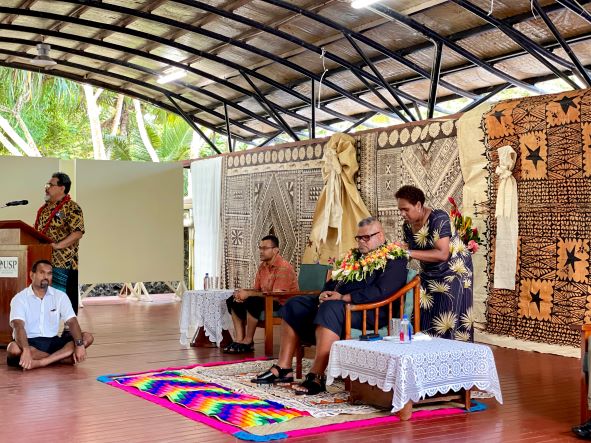Related News

Non-communicable diseases (NCDs) are already the leading preventable cause of death in the Pacific Islands.
Unless urgent action is taken, the percentage of Pacific Islanders affected by NCDs and the resulting economic burden on countries will continue to rise significantly in the coming decades.
Unfortunately, this is also due to the emergence of modern unhealthy diets, climate change, and other environmental factors that influence unhealthy lifestyles and behaviours that have had a significant impact on Pacific people’s health.
The University of the South Pacific (USP) recently launched the Global Community Food and Health (GCFaH) project, bringing together key stakeholders in agriculture, food security, and health at USP’s Oceania Centre.
During the opening remarks of the GCFaH project launch, USP Vice-Chancellor and President Professor Pal Ahluwalia thanked and welcomed the Fijian Government to USP and expressed his heartfelt congratulations to the Honourable Minister of Agriculture and Waterways on his new appointment.
“It’s an absolute honour to welcome you all on behalf of the University to the formal launch of the UK National Institute of Health and Research funded the (NIHR) Global Health Research Group on Community food for human nutrition and Planetary Health (GCFAH) in Small Islands Project,” Professor Pal Ahluwalia said.
“Today, we celebrate the launch and initiative that has been made possible through the partnership and close collaboration of its international, regional, and national partners, which is committed to developing health programmes and training to address this problem in the Pacific region and being a key partner of this research project is an important example of our commitment.”
The gravity of the threat that NCDs pose to the people of Fiji and other Pacific Island countries and territories, as well as the urgency of addressing it, was recognised, by the Honourable Minister of Agriculture and Waterways, Mr Vatimi Rayalu.
Honourable Rayalu said, “Indeed, we have an amputation roughly every 8 hours, in Fiji, which is a terrible impost on our health services. Health must be accorded greater attention, and more robust interventions are introduced.”
“The frequent occurrence of natural disasters has created significant issues for food security not only in Fiji but also around the Pacific, and with the accompanying problem of malnutrition, NCDs are rising at an alarming rate in Fiji.”
“When I first heard about food mapping, I thought it was some idea from outer space but when Professor started talking about food netting, I realised that it is similar to some of the systems and approaches that we have been employing in the Ministry of Agriculture to address,” he added.
While launching the GCFaH project, Mr Rayalu stated, “The Ministry of Agriculture is fully committed and supports this project.”
The GCFaH project builds on the previous ICOFaN project and focuses on co-creating interventions in communities to improve household diet, nutrition, and food security in small island countries, as well as reduce the burden of nutrition-related diseases, by promoting increased community-based food production (CFP) based on agroecological principles.
The project’s research will be conducted in Fiji, the Philippines, St Vincent, and St Lucia. The University of Exeter and the University of the West Indies are the joint lead institutions with the University of the South Pacific and the Foundation for Rural Integrated Enterprises & Development (FRIEND) as partners in Fiji, alongside universities in the Philippines, United Kingdom (UK), and Canada.
NCDs such as heart disease, cancer, chronic respiratory disease, and diabetes are the leading causes of death worldwide and are a growing global health concern.
The research is funded by the UK’s National Institute of Health Research using UK aid from the UK Government to support global health research.